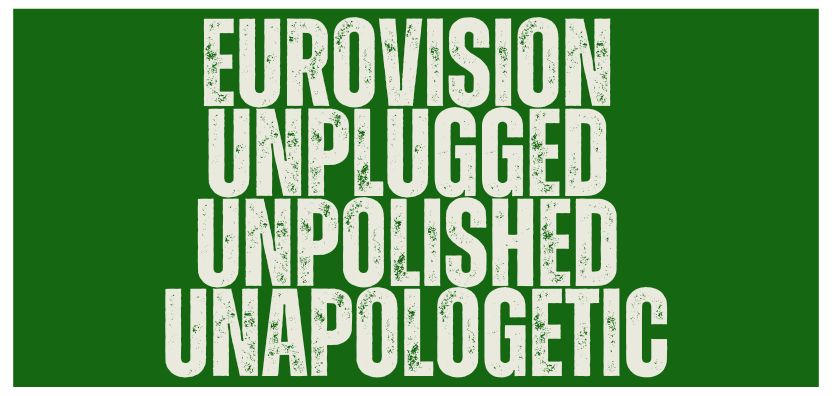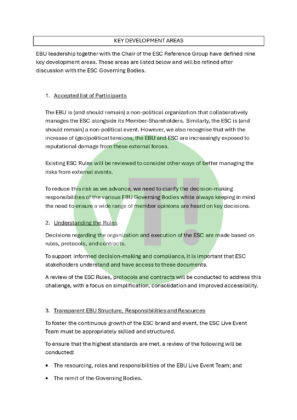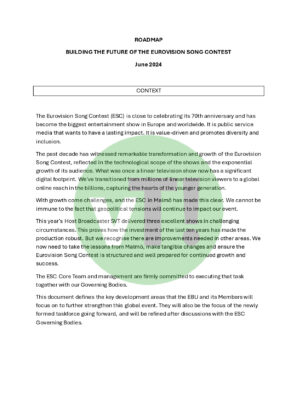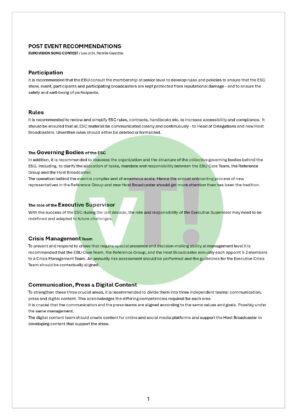
|
Getting your Trinity Audio player ready...
|
Spanish outlet elDiario.es has today published a series of confidential EBU documents exposing both the scale of internal rule breaches at last year’s Eurovision Song Contest, and the growing unease inside the contest’s leadership about its future.
A stern letter
Following events in Malmo, the EBU issued a sternly-worded warning to Israel’s broadcaster KAN. The letter, included in the leaked documents, lays out in black and white what many in Malmö’s press room and delegation corridors were already whispering: that the Israeli delegation’s media team and commentators repeatedly breached Eurovision’s strict neutrality rules.
Key allegations
The Israeli media team was cited for “intrusive, offensive and provocative” behaviour towards other delegations backstage. KAN commentators reportedly made discriminatory remarks about certain countries’ performances, with the Irish entry explicitly mentioned as a target of on-air bias.
The EBU reminded Israel that all commentary must remain strictly neutral—no political, commercial, or discriminatory comments are permitted. As a result of these breaches, KAN’s delegation was relocated from the main delegation area, and the EBU reserved the right to apply fines and further sanctions.
The letter makes clear this was not business as usual: “Any behaviour which harms the reputation and/or the integrity of the Shows is subject to punitive fines… The right to apply sanctions… is reserved.”
EBU rules under the microscope
The leaks reveal a contest in flux, grappling with the ever-present tension between political realities and its official non-political stance. Eurovision’s rules have always emphasised inclusivity and fairness—but as this year showed, that’s easier written than enforced.
Annexes published alongside the warning letter detail exactly what is expected – broadcasters are welcome to film backstage and share content—provided it is respectful, avoids politicisation, and does not provoke or attack others. Commentators must not urge votes, promote any political causes, or make unacceptable remarks (sexist, racist, or otherwise discriminatory). Neutrality is paramount—both on air and in all official communications.
An independent review

The documents also reveal that the EBU has already been undertaking serious soul-searching behind the scenes. Pernille Gaardbo, formerly Executive Producer of Eurovision, was tasked with leading an independent review into how Eurovision is managed, governed, and delivered.
Based on 53 interviews with key staff, the Reference Group, and almost every head of delegation, her report became the basis for a new Eurovision Roadmap, circulated to all broadcasters.
The report lists nine key areas for improvement across all participating broadcasters. An accepted list of participants should clarify who gets to take part and manage political/reputational risks.
Reviewing and simplifying rules, protocols, and contracts will place emphasis on clearer communication and compliance. There should be a review of the resourcing and remit of the EBU Live Event Team and governing bodies.
It called for more openness in how the Reference Group operates, with criteria for membership and voting reviewed. Transparency will be served by making sure agendas and notes from Reference Group meetings are made available to members, along with detailed debriefs after each grand final.
Effort must be put into building more proactive collaboration with fan groups, influencers, and media. Organisers should also reassess the safety and welfare arrangements backstage; potentially appointing a Welfare Producer. This happened for 2025.
Finally, Gaardbo’s report called for the formation of a cross-EBU/host broadcaster crisis team, with annual risk assessments and clear guidelines, along with improved communication, dividing teams by specialism, ensuring aligned messaging, and supporting host broadcasters in digital content.
A contest at the crossroads
 The roadmap acknowledges just how far the contest has come: from millions of TV viewers to a digital phenomenon reaching billions. But with growth comes risk. Malmö exposed how geopolitical tensions can spill into the arena, how neutrality can be threatened, and how public trust can be shaken by perceptions of bias or mismanagement.
The roadmap acknowledges just how far the contest has come: from millions of TV viewers to a digital phenomenon reaching billions. But with growth comes risk. Malmö exposed how geopolitical tensions can spill into the arena, how neutrality can be threatened, and how public trust can be shaken by perceptions of bias or mismanagement.
The EBU’s own leadership, alongside the Reference Group, are now under pressure to act. Not just to paper over the cracks, but to fundamentally reform how the show is run. That means tightening rules, enforcing standards, and—most of all—communicating clearly and openly with both participants and fans.
What happens next?
Many of the recommendations are already being implemented. There are annual reviews of all contest rules and contracts, with a focus on accessibility and simplicity. Formal onboarding is now in place for new Reference Group and Host Broadcaster representatives. Organisers have agreed to greater open publication of meeting agendas and decisions.
Along with stronger guidelines to protect artists and delegations backstage, this year several new roles were put in place to manage welfare and reputational risk. Efforts have also been made to tighten control over digital and press output, limiting the amount of rehearsal footage released to fan sites and the public. Websites are no longer granted online or in-venue access to the early rehearsals and may not take photographs at the formal final run-throughs.
Along with welfare management, performers are guaranteed more backstage privacy during rehearsals. There are camera free zones available throughout the week.
And for delegations who step out of line? The EBU has made it clear: the days of quiet warnings and backroom diplomacy are over. Sanctions, fines, and even expulsion from the delegation bubble are now firmly on the table.
For many Eurovision watchers, these leaks confirm what’s been brewing for a while: the contest is at a crossroads. The dazzling spectacle and spirit of unity remain—but the backstage politics and fractures are impossible to ignore.
The EBU’s new roadmap is ambitious. Time will tell if it’s enough to restore trust, protect the show’s reputation, and keep Eurovision at the heart of European (and global) culture for the next seventy years.
As these internal struggles spill out into public view, one thing’s certain: Eurovision’s next act will be watched more closely than ever.
(and yes, these convenient ‘leaks‘ do all give the impression of an organisation preparing the ground to make an ‘announcement’.)











